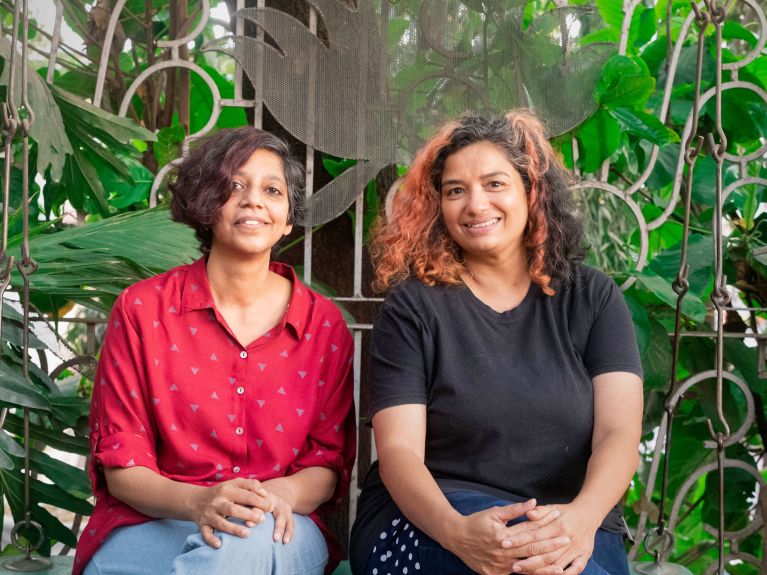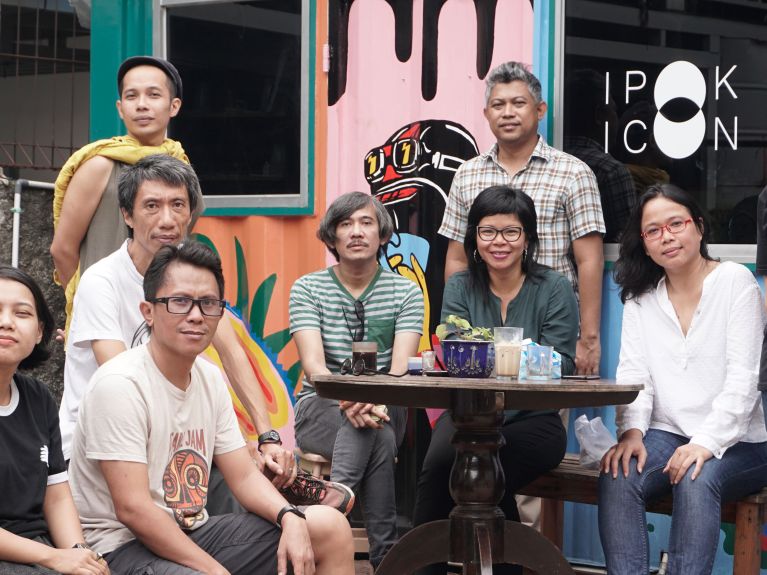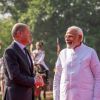Artistic collective engagement
Goethe Medal 2022 goes to Indian artists Nimi Ravindran and Shiva Pathak.

They want “to harness the power of art for a more peaceful, equal, just and inclusive society”. That is the mission that Nimi Ravindran and Shiva Pathak has set themselves. To achieve it, the two women teamed up to found Sandbox Collective in the Indian city of Bangalore in 2013. In their work, they “continue to take a stand against nationalist, religious and fundamentalist politics”, according to a statement released by Germany’s Goethe-Institut. This is one of the reasons why it is awarding the Goethe Medal to Ravindran and Pathak this year.
They will be presented with the medal, which is an official decoration of the Federal Republic of Germany, in Weimar on 28 August – alongside the multimedia artist Mohamed Abla from Egypt and the director of the Johannesburg Holocaust & Genocide Centre, Tali Nates from South Africa. What they all have in common is that their work establishes artistic or academic links between their regions and Germany and Europe. That they build bridges for mutual understanding and, in the case of Ravindran and Pathak, create “safe spaces for art, activism, debate and dialogue”.
It all began at the Goethe-Institut in Bangalore
These are the values that Gender Bender stands for, the festival that Sandbox Collective has been staging in cooperation with the Goethe-Institut Bangalore since 2015. Initially it also took place there, but since 2019 has found a home for itself at the Bangalore International Center. Gender Bender showcases artistic works that explore gender issues in innovative ways. It also features workshops, lectures, music, dance and installations. After being forced online by the pandemic in 2021, the next festival is to be held in December.
In addition to Gender Bender, Nimi Ravindran and Shiva Pathak also organise theatre, music and dance productions, offer drama workshops and run a residence programme for artists. They have also collaborated with numerous international artists and institutions, including German theatre groups such as Rimini Protokoll and Mixed Pickles or the Berlin-based media artist Ben Brix, who was in Bangalore in 2018 on a Goethe-Institut scholarship.
Ravindran was a journalist, Pathak worked in development aid
Ravindran and Pathak themselves got to know each other at a theatre production in 2003. Born in 1971, Nimi Ravindran is an author, theatre-maker and director of the Kamshet Arts Festival. She was assistant editor at India Today and part of the team that founded the well-known Ranga Shankara theatre. Explaining how she ended up in art, she says: “I remember my grandfather telling me amazing stories from Indian mythology when I was just three years old. Later, when I was six, I played the tiny role of a woodcutter in ‘Snow White’ and fell hopelessly in love with the stage.”
Shiva Pathak was born in 1980. After graduating, she spent four years working in development aid before realising that her heart was really in art. Ever since, she has been living in Bangalore as an actor, producer and cultural manager. What was her first experience of art? Her father’s record collection. As a child, she and her cousins would spend the summer holidays “putting together a programme for the grown-ups, complete with admission tickets and everything – we would sing, dance and perform.”

Collective spirit is bang on trend
Ravindran and Pathak are bang on trend with their collective spirit. For the first time, the shortlist for the UK’s Turner Prize consisted entirely of collectives in 2021. The documenta art exhibition in Kassel will also be curated for the first time in 2022 by a group of artists, namely ruangrupa from Indonesia. Of course, there has long been a tradition of artists joining together to form collectives: famous groups include Die Brücke and Der Blaue Reiter in Germany, and the Bombay Progressive Artists’ Group in India.
“We founded Sandbox Collective because we wanted to be the change we wanted to see”, says Shiva Pathak. “As artists and women, we had certain problems with the system and with society, and wanted to address some of these in our work.” She explains that India has seen “a huge transformation over the past 20 years, as regards both legislation and the way we as a society approach questions relating to gender and sexuality. However, this is not yet enough. For every step forwards, there is another that throws us back again.” The artists view the Goethe Medal as an important endorsement of their work. And because they have “many friends and partners” in Germany, the award ceremony will likewise be “a very special occasion” for them.


